Cocaine is known as one of the most powerful party drugs. It affects the levels of dopamine in the brain and produces a strong high or euphoria, and gives the user more energy. Cocaine is severely addictive both physical and on a psychological level. Without the constant stimulus on the brain (the increase of dopamine) that cocaine causes, users will constantly need to ingest more and more of the drug as without it the natural secretion of dopamine is no longer enough to experience pleasure in normal activities. Cocaine is a very potent drug, making it very hard to quit. While many people attempt to kick the habit without help, they are statistically much more likely to relapse and fail.
Cocaine is a strong central nervous system stimulant that works by increasing levels of the neurotransmitter dopamine in the brain. Dopamine is released normally and naturally by pleasurable stimuli such as food or sex. Recreational users take cocaine for the euphoria, joy and energy they feel while they are on the drug. Cocaine is typically ingested by snorting, injecting intravenously, or smoking.
While cocaine shares properties with other illegal substances it is one of the hardest to detox from. When the brain is not producing enough dopamine naturally because of prolonged cocaine use, many users fall into a depression and are more likely to relapse. Even some successful users who managed to rid themselves of the drug often fall victim to other substances like prescription medication or alcohol.
Some cocaine withdrawal symptoms include:
- Anxiety
- Mood Swings
- Variable energy
- Poor concentration
- Low enthusiasm and lethargy
- Vivid and unpleasant dreams
- Increased appetite
- Nausea and vomiting
- Suicidal thoughts
- Itching
- Insomnia
- Paranoia
- Fatigue
- Strong cravings
- Depression
By far the best an safest option to successfully end one’s addiction to cocaine is to check into a detox clinic or drug rehab center. Under the careful supervision of doctors and nurses, the patient can be prescribed medicine to help with the withdrawal symptoms and be under constant monitoring as to prevent any chance of relapse. Upon release from such a facility there are support groups like Narcotics Anonymous and others that can form a fellowship with the addict to help understand their addiction and put it behind them.
 Cocaine is a strong central nervous system stimulant that works by increasing levels of the neurotransmitter dopamine in the brain. Dopamine is released normally and naturally by pleasurable stimuli such as food or sex. Recreational users take cocaine for the euphoria, joy and energy they feel while they are on the drug. Cocaine is typically ingested by snorting, injecting intravenously, or smoking.
Cocaine is a strong central nervous system stimulant that works by increasing levels of the neurotransmitter dopamine in the brain. Dopamine is released normally and naturally by pleasurable stimuli such as food or sex. Recreational users take cocaine for the euphoria, joy and energy they feel while they are on the drug. Cocaine is typically ingested by snorting, injecting intravenously, or smoking.